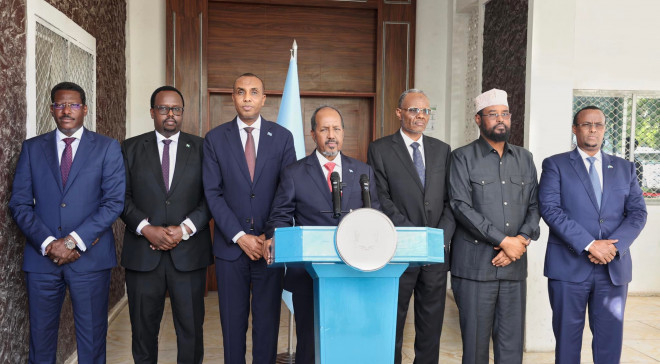Dr. Naima Osman
Wednesday July 12, 2023

Today, I convey to you with a heavy heart, burdened by
the tragic tale of my beloved Somalia. As I reminisce about the year 1991 when
I fled from the clutches of a devastating civil war, I am filled with a
profound sense of disappointment and despair. Over the past 33 years, my
homeland has been marred by a profound hopelessness, characterized by an
alarming prevalence of injustices, impunity, and political disarray.
Amidst
the ruins of a once vibrant nation, corruption runs rampant, devouring the very
essence of our society. The abuse of power has become an unfortunate norm,
leaving ordinary citizens defenseless against its vile grip. Unarmed clans and
minorities have been subjected to horrendous mistreatment; their voices
silenced as they endure unspeakable atrocities. It is a dark reality where the
elites have cunningly utilized clans as mere pawns to preserve their grasp on
power, heedless of the suffering inflicted upon the innocent.
In this
shattered state, trust has been shattered as well. The people of Somalia, weary
and disheartened, no longer know what lies beyond the horizon. Uncertainty
looms large, casting a shadow of doubt upon the aspirations of a better
tomorrow. Even after enduring the tribulations of these arduous years, we are
faced now with the distressing news that President barely understands the
sickness facing the country.
History
tells us that Japan was defeated miserably by the Allied forces in the 2nd
world War but was able to transform into the second-largest economy in the
world within 10 years after the war. This was indeed a remarkable achievement.
The leadership of the country was entrusted by experience bureaucrats. They
played a significant role in transforming the Japanese economy, technology, and
infrastructure, and promoting international trade with the rest of the
world.
A look
at the Somali cabinet
President
Hassan Sheikh is either insane or he is fooling the nation. As the President of
the country, he needs to grasp that he cannot resolve 1% of Somalia’s problem
by assuming his incompetent government to rise above adversity. The lack of experience and competence in
Prime Minister Hamza Barre's cabinet and himself is a matter of great concern
for the Somali people. The country is facing numerous challenges, ranging from
economic instability to security threats, and it requires a capable and
knowledgeable team of individuals to address these issues effectively.
One
cannot underestimate the importance of experience when it comes to governance
and decision-making. Without prior exposure to public or private offices,
cabinet members are struggling to grasp the complexities of their roles and make
informed decisions. The absence of a solid background in governance, economics,
or diplomacy hindered their ability to navigate the intricate web of domestic
and international affairs.
Furthermore,
the lack of competence among cabinet members raises questions about their
ability to effectively implement policies and carry out the necessary reforms.
In a country like Somalia, which is striving to rebuild its institutions and
establish a stable government, it is crucial to have individuals with a proven
track record of success in their respective fields. Without this expertise in
place, the cabinet lacks the necessary skills to tackle pressing issues such as
corruption, poverty, and infrastructure development.
Another
concern is the political patronage and favoritism in the selection of cabinet
members and other high-ranking officials that is typical in this
administration. In the absence of a
merit-based appointment process, it is clear that individuals were chosen based
on personal connections rather than their qualifications and capabilities. This
not only undermined the credibility of the cabinet but also hampered the
government's ability to gain public trust and support.
As
alluded earlier, our nation stands at a crossroads. We are faced with numerous
challenges that require urgent attention and collective action. From security
concerns to economic hardships, from political instability to social
injustices, our people bear the brunt of these issues every day.
First
and foremost, the government must address the security situation in Somalia.
The threat of terrorism looms large, destabilizing our communities and impeding
progress. The government must work tirelessly to strengthen our security
forces, equip them with the necessary resources, and provide them with the
training and support they need to effectively combat terrorism.
Furthermore,
the economic hardships faced by our people cannot be ignored. High unemployment
rates, widespread poverty, and a lack of basic services have left many Somalis
struggling to make ends meet. The government must prioritize economic
development, create job opportunities, and invest in infrastructure projects
that will improve the living conditions of our citizens. Only through a
thriving economy can we hope to build a prosperous and sustainable future for
Somalia.
The
government must also address the deep-rooted political instability that has
plagued our nation for far too long. It is the responsibility of the leaders to
foster an environment of inclusivity, dialogue, and compromise. They must work
towards a political system that is fair, transparent, and accountable. They
need to put the interests of our people above personal gain and strive for a
government that serves the needs of all citizens, regardless of their clan or
background.
Above
all, it is imperative that the president prioritize the recruitment of
qualified professionals who could save the country. By doing so, the cabinet
can effectively address the challenges facing the country and work towards a
brighter future for Somalia and its people.
Dr.
Naima Osman
Email:
[email protected]